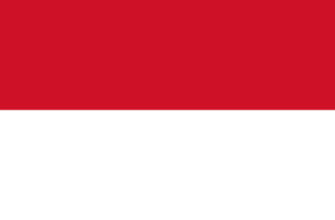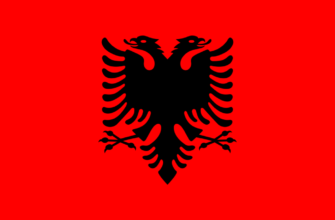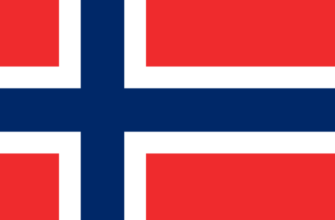One of the national symbols of Romania is the flag.
This is what a modern Romanian flag looks like:

Flag Day in Romania is celebrated on June 26. The holiday was established in 1998.
History of the flag
According to some studies, the colors of the Romanian flag were used even under Stephen the Great, who ruled Moldavia from the mid-15th to early 16th centuries.
The appearance of the three colors on the banner of Michael the Brave, who ruled Wallachia from 1593 to 1601, is known with certainty. For a short time he managed to unite all the Danubian principalities under his banner.
A new mention of the banner of Wallachia dates back to 1834. Prince Alexander Gica had a yellow cloth. In the upper left was depicted a blue eagle, holding in its paws a scepter and a sword. The eagle was topped with three white stars of color.
Battle ships of Wallachia in the middle of the 19th century went under banners in the form of rectangles with three horizontal stripes — red, yellow, blue. In the center was an eagle with a cross, as well as a star. At the corners had the letter «A». The relic was kept in the Museum of the Romanian Army.
In the middle of the 19th century, there were also Moldovan military banners. They looked like blue squares with a red cowhide head in the center. The head was topped with a crown. In each corner of the cloth is a red square with an eight-pointed star. On the reverse is St. George piercing the serpent.
In 1821, the Wallachian Uprising, led by Tudor Vladimirescu, broke out. He briefly became ruler of Wallachia. The blue-yellow-red tricolor was the symbol of the uprising.
The blue-yellow-red flag was officially approved by the provisional government in 1848, during the revolution in the Danubian principalities. Two versions of the flag were used, with horizontal and vertical stripes of blue, yellow, and red. In the center there was an inscription: «Justice, Brotherhood.» The revolutionaries explained their choice of colors by combining the blue flag of Wallachia with the golden flag of Semigradia and the red of Moldova.

In 1859-1866 the flag of united Wallachia and Moldova was in the form of a horizontal red-yellow-blue tricolor.

In 1866 Prince Karl of Prussia, who became ruler, changed the arrangement of the stripes to vertical. This version stuck for many years. On the yellow central stripe the coat of arms of the ruling dynasty was placed.
December 30, 1947 in Romania was abolished monarchy. The Socialist Republic of Romania was formed.
On the flag of 1948, which existed from January to April, the emblem was a picture of a tractor on a background of a rising sun. There was a wreath of ears. At the top was the abbreviation «RPR».

In April 1948, the coat of arms changed. Mountains and forest appeared on it, from behind which the sun was rising. On the left is the image of an oil derrick. On the sides — ears of wheat, wrapped in the lower part of the ribbon with national colors. On the ribbon was the inscription «RPR» — the abbreviated name of the republic. This version existed until September 1952.

From September 1952 to August 1965, the coat of arms was placed with a five-pointed red star at the top.

In 1965, the acronym «RPR» was replaced by the new name of the state.

In 1989 there was a revolution. Demonstrators cut the country’s coat of arms from the tricolor.

Since 1989, after the fall of the Ceausescu regime, the coat of arms was abolished.
On December 27, 1989, the national flag of Romania once again looked like a tricolor without a coat of arms.
This flag is still in effect today.
Description
A rectangular cloth with a width to length ratio of 2:3.
The rectangle is divided vertically into three equal strips. The left one, closest to the mast, is blue, the middle one is yellow, and the right one, at the free edge, is red.

Flag colors
Three colors:
- blue corresponds to 280c according to the Pantone system;
- yellow corresponds to 116c according to the Pantone system;
- red 186c according to the Pantone system.
Meaning of colors and flag symbol
Under royal rule, the colors were interpreted as follows: blue meant happy, blessed heavens; yellow, wealth; red, the bravery and selflessness of the people.
Under the socialist system, the colors were explained differently. Blue — peaceful sky over the country; yellow — vast fields of ripe wheat; red — blood of the people shed for freedom.
The colors of the current Romanian national flag are interpreted as follows: blue means freedom and independence; yellow, law; red, brotherhood.
Other Flags
The flag of the Romanian Navy is a square divided into three vertical bands of national colors. In the center of the blue stripe are two white crossed anchors.

The Standard of the President is a square bordered on three free sides by gold fringe. The upper and lower right corners have gold tassels. On a blue background is a square representing a tricolor placed in a white frame.

Flag of the Romanian Air Force

Similar flags
The flag of Romania is similar to the banners of Andorra, Moldova and Chad.
The flags of Andorra and Moldavia differ in the presence of the national emblems on the central stripe. In addition, the proportions of the Moldovan flag are 1:2.


Chad’s flag is identical to the Romanian flag, but differs by the darker blue stripe.

Interesting facts about the flag
In 2013, Romania entered the Guinness Book of World Records. On May 27, the largest national flag in the world was unfurled at the airfield in Clinceni. The flag of Romania covered an area of 80 thousand square meters and weighed 5 tons.
In 2003, the Pentagon confused the national symbols of Romania and Russia. The incident took place at an official dinner of the President of Romania and the U.S. Secretary of Defense. A photo of the mixed up tricolors was published in several newspapers. The U.S. Department of Defense had to apologize.
General information about Romania
| Official language | Romanian |
| Capital | Bucharest |
| Territory | 238,391 km² |
| Population | 19,401,658 people |
| Currency | lei (RON) |
| Phone Code | +40 |










I just love the Romanian flag! The colors are so vibrant and full of history. I remember visiting Bucharest and seeing the flag waving proudly. It really made me feel connected to the culture. Can’t wait to go back and experience it all again!
I remember visiting Romania and seeing the flag flying everywhere. It was such a vibrant mix of blue, yellow, and red! It gave me a sense of pride for the country’s rich history. I even picked up a mini flag as a memento. Such great memories!
Jessica (female):
Seeing the Romanian flag always pumps me up! It reminds me of that epic trip to Bucharest – the colors just popped everywhere, and the vibe was so alive. Flags really do carry so much energy and pride, don’t they? Totally inspired every time!
As a guy who once backpacked through Romania, seeing the flag waving proudly everywhere gave me a real sense of connection. I’ll never forget the warm smiles and stories behind those colors. Grateful for that experience—it made the flag more than just fabric to me.